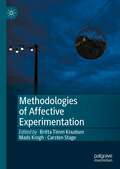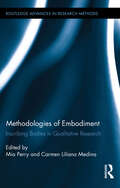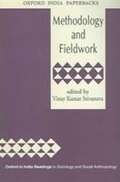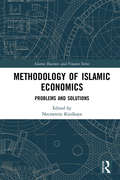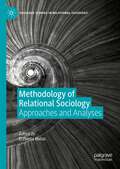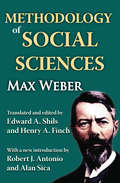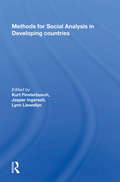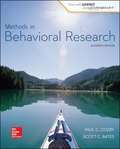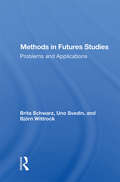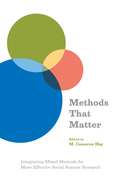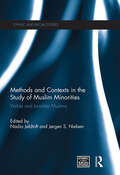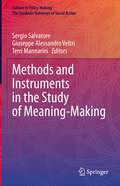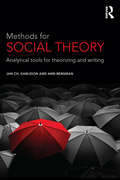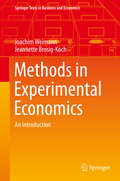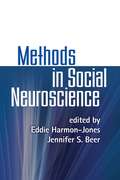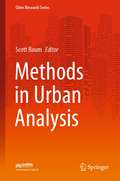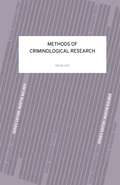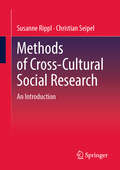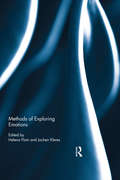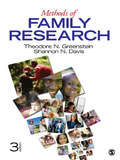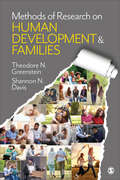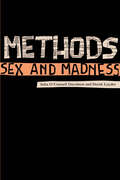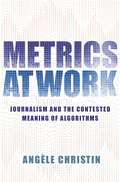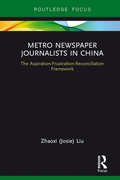- Table View
- List View
Methodologies of Affective Experimentation
by Britta Timm Knudsen Carsten Stage Mads KroghWe live in an era of experimentation – both if we look at the broader social world of politics, media and art and at the narrower context of academic knowledge production. This collection consists of 14 chapters by leading scholars in affect studies. They explore the affective dimensions of experimental practices related to, for example, activism, the COVID-19 pandemic, populism, sustainability, patient communities, music streaming, Jamaican dancehall, gangs, leadership, tourism and minority youth cultures. Experiments are understood as intentionally crafted milieus aimed at (re)presenting unnoticed aspects of the world, as non-linear processes with unpredictable outcomes, and as ways of giving the future a provisional form. The collection responds to a pressing need to understand the intersection between affect, experimentation and sociocultural change by offering empirical strategies to explore how, and with what consequences, experimentation is affective.
Methodologies of Embodiment: Inscribing Bodies in Qualitative Research (Routledge Advances in Research Methods)
by Mia Perry Carmen Liliana MedinaThis volume is dedicated to exploring and exposing the challenges, the possibilities, and the processes of empirical work in embodiment. Grounded in qualitative inquiry in the humanities and social sciences, the chapters describe perspectives and contexts of embodied research, but focus on the methodologies, methods, and analytic frames taken up to grapple with this ever-more theorised aspect of qualitative inquiry. The authors drawn together in this volume share an investment in the ways in which the body inscribes and is inscribed within research that foregrounds the cultural, social, affective, and political discourses that are at the core of how bodies act and are acted upon.
Methodology and Fieldwork
by Vinay Kumar SrivastavaDivided into four parts, the first section touches on the nature of social research; the second discusses fieldwork; the third reviews different survey methods; and the final section grapples with issues of ethics in research.
Methodology of Islamic Economics: Problems and Solutions (Islamic Business and Finance Series)
by Necmettin KizilkayaIn its pursuit to equip the reader with a basic knowledge of Islamic economics, this book divulges the micro-foundations of the discipline, and highlights the predominant schools of thought that exist in the field. It explains, in simple terms, what Islamic economics entails and how it can be studied as a science in relation to the Holy Quran, the Sunnah and the Islamic intellectual tradition based on these two sources. The book familiarizes the reader with knowledge of the basic maxims of the discipline. It then establishes the arguments that are presented by the proponents of religion-based economics, specifically Islam, and apprises readers about the aforementioned schools as they exist. A number of chapters consider the dimension of the dilemmas the discipline is facing, and the chronological progress of the field is reviewed, hence providing a comprehensive overview of the topic. The book deals with the issues about the origins of Islamic economics, the basic methodological questions, the use of the opportunities offered by fiqh in the methodological discussions and the main problems arising from the encounter with other cultures and civilizations. It offers practical solutions, despite the differing schools of thought, not unlike the development of conventional Economics where radical differences between Keynesian, Classical and Monetarist approaches existed. It concludes by incorporating some of the finest works that explain to the reader how Islamic economics may progress as a discipline. This guide will provide both students and researchers in Comparative Economic Studies, Islamic Economics and Islamic Finance with an essential overview of the field.
Methodology of Relational Sociology: Approaches and Analyses (Palgrave Studies in Relational Sociology)
by Elżbieta HałasThis is the first book addressing explicitly and specifically the methodological issues of relational sociology, and more broadly of the new relational paradigm in social sciences. The dynamically developing relational movement in social and cultural sciences is fueled by various classical and contemporary theoretical inspirations. Relational approaches propose various models of relational analyses, such as field analysis, social space analysis, network analysis, or the critical realist relational heuristic. The relational turn, which promotes interdisciplinarity in research, simultaneously reflects the drive towards an innovative reconstruction of sociology. Contemporary relational sociology is at the forefront of the relational movement. The program of relational sociology is still being shaped, frequently becoming the subject of discussions with different standpoints expressed. The aim of this book is to reflect on various relational approaches and models of relational analysis. Answers to two basic questions are sought: Are there foundations for a methodological unity of relational sociology, despite the diversity of approaches? And does relational sociology form a new paradigm? To answer these questions, it is necessary to investigate differences between the relational paradigm and the earlier, competing sociological paradigms. The answers to key questions show what innovations the methodology of relational sociology brings, i.e. what are the methodological consequences of the relational concept of the social fact. The broadly defined horizon of methodological issues is presented. The book creates an open space for discussion on various approaches and varieties of relational analysis, as well as the possibility of their methodological synthesis within relational sociology.
Methodology of Social Sciences: Max Weber
by Max WeberMax Weber wrote these methodological essays in the closest intimacy with actual research and against a background of constant and intensive meditation on substantive problems in the theory and strategy of the social sciences. They were written between 1903 and 1917, the most productive of Max Weber's life, when he was working on his studies in the sociology of religion and Wirtschaft und Gesellschaft.Weber had done important work in economic and legal history and had taught economic theory. On the basis of original investigations, he had acquired a specialist's knowledge of the details of German economic and social structure. His always vital concern for the political prosperity of Germany among the nations thrust him deeply into discussion of political ideals and programs.Weber's methodology still holds interest for us. Some of its shortcomings, from the contemporary viewpoint, may be attributed to the fact that some of the methodological problems that he treated could not be satisfactorily resolved prior to certain actual developments in research technique. These few qualifications aside, the work remains a pioneering work in large scale social research, from one of the field's masters.
Methods For Social Analysis In Developing Countries
by Kurt Finsterbusch Jasper Ingersoll Lynn LlewellynThis book fills the gap between social science methodology books and the realities of conducting social research under Third World conditions. It focuses on social impact assessment methods and cost effective social analyses for development projects and programs in US and Third World countries.
Methods In Behavioral Research: (Twelfth Edition)
by Paul C. Cozby Scott C. BatesMethods in Behavioral Research continues to guide students toward success by helping them study smarter and more efficiently. In tandem with LearnSmart, McGraw-Hill Education's adaptive and personalized learning program, Cozby and Bates provide helpful pedagogy, rich examples, and a clear voice in their approach to methodological decision-making.
Methods In Futures Studies: Problems And Applications
by Brita SchwarzThis book presents three examples of futures research that illustrate the problems of applying knowledge during the course of a futures research project, the ways in which different methodologies interact, and various means of combining and adapting methodological tools and techniques.
Methods That Matter: Integrating Mixed Methods for More Effective Social Science Research
by M. Cameron HayTo do research that really makes a difference--the authors of this book argue--social scientists need questions and methods that reflect the complexity of the world. Bringing together a consortium of voices across a variety of fields, Methods that Matter offers compelling and successful examples of mixed methods research that do just that. In case after case, the researchers here break out of the traditional methodological silos that have long separated social science disciplines in order to better describe the intricacies of our personal and social worlds. Historically, the largest division between social science methods has been that between quantitative and qualitative measures. For people trained in psychology or sociology, the bias has been toward the former, using surveys and experiments that yield readily comparable numerical results. For people trained in anthropology, it has been toward the latter, using ethnographic observations and interviews that offer richer nuances of meaning but are difficult to compare across societies. Discussing their own endeavors to combine the quantitative with the qualitative, the authors invite readers into a conversation about the best designs and practices of mixed methodologies to stimulate creative ideas and find new pathways of insight. The result is an engaging exploration of a promising new approach to the social sciences.
Methods and Contexts in the Study of Muslim Minorities: Visible and Invisible Muslims (Ethnic and Racial Studies)
by Jørgen S. Nielsen Nadia Jeldtoft Jørgen S. NielsenIn the past decade Muslims in Europe have been the subject of heated debates on the place and role of religion in the public space. Research into the issues involved has often used visible and formalised expressions of Muslim religiosity as its empirical point of departure. This book instead examines the microlevel workings of Muslim minority religiosity to offer a new perspective on these debates. Contributors to this volume examine the forms of Muslim religiosity which are not dependent on the official or semi-official settings of organised religion. These ethnographic studies investigate a range of examples of non-organised Islam, ranging from salafi-jihadism, to converts to Islam, to everyday spiritualities of Muslim in Europe. By exploring these neglected forms of Muslim religiosity, this book is able to build up a more nuanced picture of the role of Muslims in Europe. It will be of interest to academics, researchers and graduate students of Religion, Ethnic Studies, Migration Studies, Sociology and Political Science. This book was previously published as a special issue of Ethnic and Racial Studies.
Methods and Instruments in the Study of Meaning-Making (Culture in Policy Making: The Symbolic Universes of Social Action)
by Sergio Salvatore Terri Mannarini Giuseppe Alessandro VeltriThis volume develops a theoretical framework for the modelling of meaning-making and cultural processes as crucial to the scientific study of contemporary complex societies. It focuses on the methodological and empirical aspects of the analysis of culture and its dynamics that could be applied to policymaking and to the understanding of social phenomena. It covers culture-based segmentation, ad hoc survey instruments like the VOC and PROSERV questionnaires, discourse flow analysis, the Homogenization of Classification Functions Measurement, and others. It also presents a detailed discussion of the methodology of cultural analysis in contexts of health and education. The volume showcases a top-down approach by including quantitative methods and/or automatized or semi-automatized procedures, and at the same time supports a hermeneutic, bottom-up, abductive approach, focused on the situated dynamics of meaning-making. It provides insights from cultural studies, social statistics, social policy, and research methodology in the social sciences. This is a useful resource for academics involved in studying cultural dynamics and for policy-oriented researchers and decision-makers who are interested in cultural dimensions of the design, implementation and reception of public policies.
Methods for Social Theory: Analytical tools for theorizing and writing
by Jan Ch. Karlsson Ann BergmanThis book constitutes a practical guide to the important skills of both theorizing and writing in social scientific scholarship, focusing on the importance of identifying relations between concepts that are useful for explaining social entities and of producing a text that convincingly advances the theory that has been constructed. Taking as its point of departure the distinction between the research process and the reporting process – between clarifying one’s ideas to oneself and writing to express these ideas clearly to others – this volume concentrates on writing when theorizing as a way of thinking, emphasizing the series of relations that exist between ontology, epistemology and rhetoric upon which successful theoretical writing depends. Richly illustrated with practical examples, the book is divided into two parts, the first of which presents techniques for theorizing based upon visualized and logical connections of ideas, concepts and empirical patterns in both free and systematic ways, and the second part providing techniques for structuring and presenting arguments in essays, papers, articles or books.As such, Methods for Social Theory offers a toolbox for the development and presentation of social thought, which will prove essential for students and teachers across the social sciences.
Methods in Experimental Economics: An Introduction (Springer Texts in Business and Economics)
by Joachim Weimann Jeannette Brosig-KochThis textbook provides a hands-on and intuitive overview of the methodological foundations of experimental economics. Experimental economic research has been an integral part of economic science for quite some time and is gaining more and more attention in related disciplines. The book addresses the design and execution of experiments, the evaluation of experimental data and the equipment of an experimental laboratory. It illustrates the challenges involved in designing and conducting experiments and helps the reader to address them in practice.
Methods in Social Neuroscience
by Jennifer S. Beer Eddie Harmon-JonesStraightforward and practical, this is the first book to provide detailed guidance for using neurobiological methods in the study of human social behavior, personality, and affect. Each chapter clearly introduces the method at hand, provides examples of the method's applications, discusses its strengths and limitations, and reviews concrete experimental design considerations. Written by acknowledged experts, chapters cover neuroimaging techniques, genetic measurement, hormonal methods, lesion studies, startle eyeblink responses, facial electromyography, autonomic nervous system responses, and modeling based on neural networks.
Methods in Urban Analysis (Cities Research Series)
by Scott BaumThis book highlights major quantitative and qualitative methods and approaches used in the field of urban analysis. The respective chapters cover the background and relevance of various approaches to urban studies and offer guidance on implementing specific methodologies. Each chapter also provides links to real-world examples. The book is unique in its focus on Australian examples and subject matter, presented by recognized experts in the field.
Methods of Criminological Research
by Victor Jupp Dr Victor JuppExamining the different ways in which data can be collected and analyzed for research on crime and criminal justice, this book deals with social surveys, experimental methods, official statistics, observation and detailed interviews. This practical text includes sections on: * methods of criminological research * types of data* measuring and explaining crime * studying the criminal justice system * gaining access* publishing results. Throughout, it emphasizes the necessity of examining forms of data collection and analysis within the context of the criminological problems being investigated, the theoretical approaches used to address these problems, and the political and institutional contexts within which research takes place.
Methods of Cross-Cultural Social Research: An Introduction
by Susanne Rippl Christian SeipelCross-cultural comparison is gaining increasing importance in the context of globalization and the internationalization of many areas of lifeThe aim of this volume is to provide a concise and practical introduction to the methods of cross-cultural research. In particular, the possibilities and limitations of cross-cultural survey research are addressed. The book offers a solid foundation for a critical approach to cross-cultural studies, but it also imparts basic knowledge for conducting one’s own cross-cultural research.
Methods of Exploring Emotions
by Helena Flam and Jochen KleresGathering scholars from different disciplines, this book is the first on how to study emotions using sociological, historical, linguistic, anthropological, psychological, cultural, and mixed approaches. Bringing together the emerging lines of inquiry, it lays foundations for an overdue methodological debate. The volume offers entrancing short essays, richly illustrated with examples and anecdotes, that provide basic knowledge about how to pursue emotions in texts, interviews, observations, spoken language, visuals, historical documents, and surveys. The contributors are respectful of those being researched and are mindful of the effects of their own feelings on the conclusions. The book thus touches upon the ethics of research in vivid first person accounts. Methods are notoriously difficult to teach—this collection fills the gap between dry methods books and students’ need to know more about the actual research practice.
Methods of Family Research
by Shannon N. Davis Theodore N. GreensteinProud sponsor of the 2019 SAGE Keith Roberts Teaching Innovations Award—enabling graduate students and early career faculty to attend the annual ASA pre-conference teaching and learning workshop. In the 3rd edition of Methods of Family Research, authors Theodore N. Greenstein and Shannon N. Davis continue to help students better understand the research results they encounter in doing family research. Using real-life examples to illustrate important concepts that family researchers encounter regularly, the text covers traditional quantitative methods, qualitative methods, and the mixed-method approach. Written in a clear, concise style, this book differs from other research methods texts, which focus on teaching students how to produce research, by teaching them how to consume research in a sophisticated, effective manner. The book introduces the basic concepts of social science research methods without excessive technical details.
Methods of Research on Human Development and Families
by Shannon N. Davis Theodore N. GreensteinMethods of Research on Human Development and Families is an introduction to quantitative and qualitative research methods that teaches readers how to be intelligent and critical consumers of research on families. This new book has been adapted from the author team’s previous SAGE text, Methods of Family Research, and includes applications and examples from both family science and human development research. With a focus on interpreting and understanding research techniques rather than doing research, this text illustrates how research on families is conducted and helps students gain the competence and confidence to effectively read, interpret, and critique published research reports.
Methods of Research on Human Development and Families
by Shannon N. Davis Theodore N. GreensteinMethods of Research on Human Development and Families is an introduction to quantitative and qualitative research methods that teaches readers how to be intelligent and critical consumers of research on families. This new book has been adapted from the author team’s previous SAGE text, Methods of Family Research, and includes applications and examples from both family science and human development research. With a focus on interpreting and understanding research techniques rather than doing research, this text illustrates how research on families is conducted and helps students gain the competence and confidence to effectively read, interpret, and critique published research reports.
Methods, Sex and Madness
by Julia O'Connell Davidson Dr Derek LayderSocial research yields knowledge which powerfully affects our daily lives. The 'facts' it generates shape not just how we see ourselves and others, but also whether or not we see the existing status quo as normal, just and legitimate. This book examines and questions the methods used by social researchers to produce such knowledge. It focuses chiefly on research into human sexuality and madness. It introduces and critically assesses everything from survey methods to participant observation. It opens up broader philosophical debates about the nature of knowledge, and highlights issues surrounding the ethics and politics of research. The book looks at the research community and the research process in detail before moving on to examine the main techniques used in social research:* the use of official statistics* the survey method* interviewing* laboratory observation* ethnography* the use of documentary sources* textual analysis.By exploring both technical and conceptual problems in the work of researchers like Freud and Kinsey, and by considering the difficulties faced by researchers concerned with phenomena such as rape, witch hunts and prostitution this book makes methodological issues both interesting and accessible.
Metrics at Work: Journalism and the Contested Meaning of Algorithms
by Angele ChristinThe starkly different ways that American and French online news companies respond to audience analytics and what this means for the future of newsWhen the news moved online, journalists suddenly learned what their audiences actually liked, through algorithmic technologies that scrutinize web traffic and activity. Has this advent of audience metrics changed journalists’ work practices and professional identities? In Metrics at Work, Angèle Christin documents the ways that journalists grapple with audience data in the form of clicks, and analyzes how new forms of clickbait journalism travel across national borders.Drawing on four years of fieldwork in web newsrooms in the United States and France, including more than one hundred interviews with journalists, Christin reveals many similarities among the media groups examined—their editorial goals, technological tools, and even office furniture. Yet she uncovers crucial and paradoxical differences in how American and French journalists understand audience analytics and how these affect the news produced in each country. American journalists routinely disregard traffic numbers and primarily rely on the opinion of their peers to define journalistic quality. Meanwhile, French journalists fixate on internet traffic and view these numbers as a sign of their resonance in the public sphere. Christin offers cultural and historical explanations for these disparities, arguing that distinct journalistic traditions structure how journalists make sense of digital measurements in the two countries.Contrary to the popular belief that analytics and algorithms are globally homogenizing forces, Metrics at Work shows that computational technologies can have surprisingly divergent ramifications for work and organizations worldwide.
Metro Newspaper Journalists in China: The Aspiration-Frustration-Reconciliation Framework (Routledge Focus on Journalism Studies)
by Zhaoxi (Josie) LiuThis book explores how journalists at local metro papers in a south-western China metropolis give meaning to their work and how these meanings are shaped by the specific social environment within which these journalists operate. These metro papers provide the bulk of daily news to the general public in China, yet are often understudied compared to the country’s party news outlets. Informed by fieldwork in four metro newspapers, the book puts forward a grounded theory for exploring journalists’ occupational culture: the aspiration-frustration-reconciliation framework.
